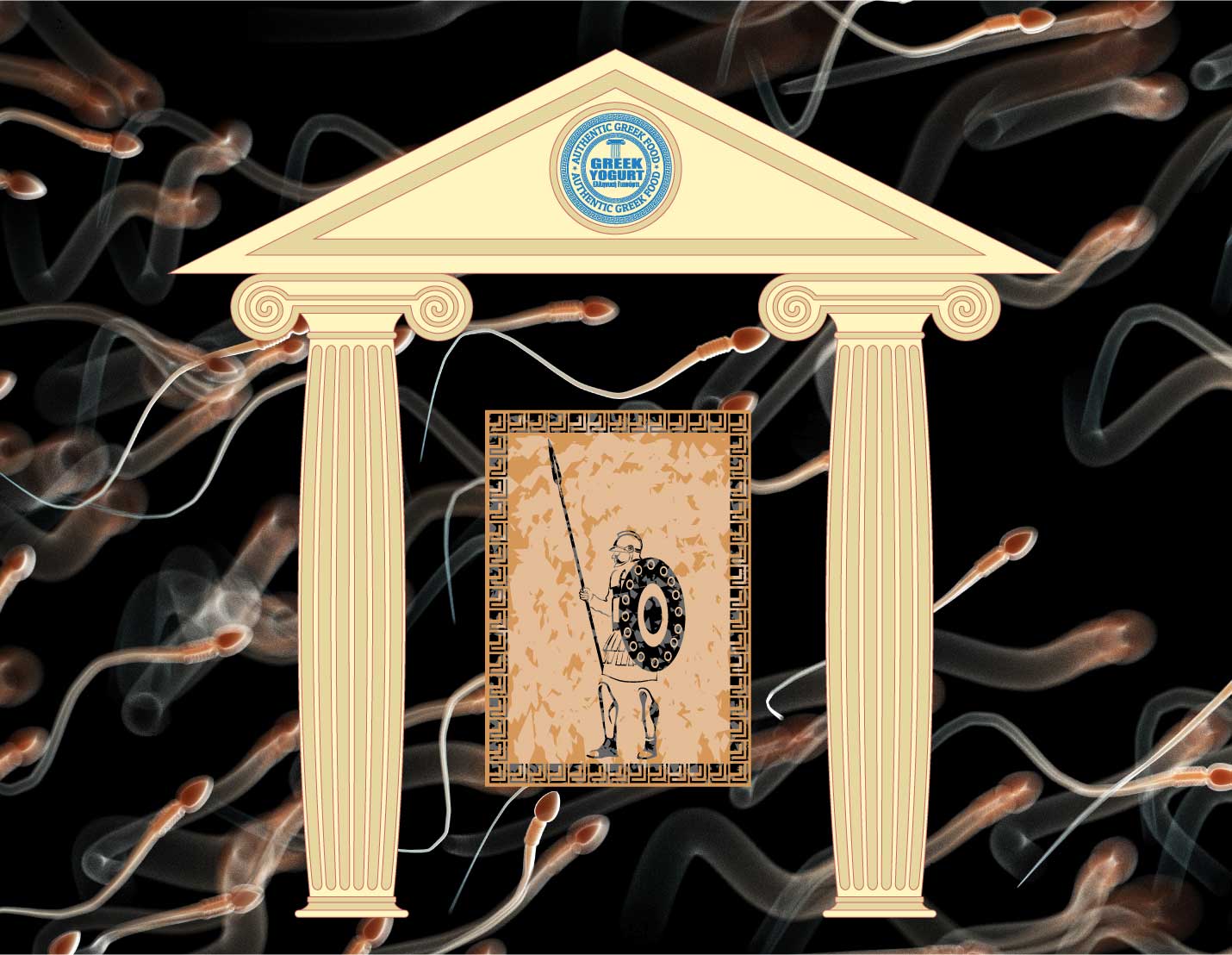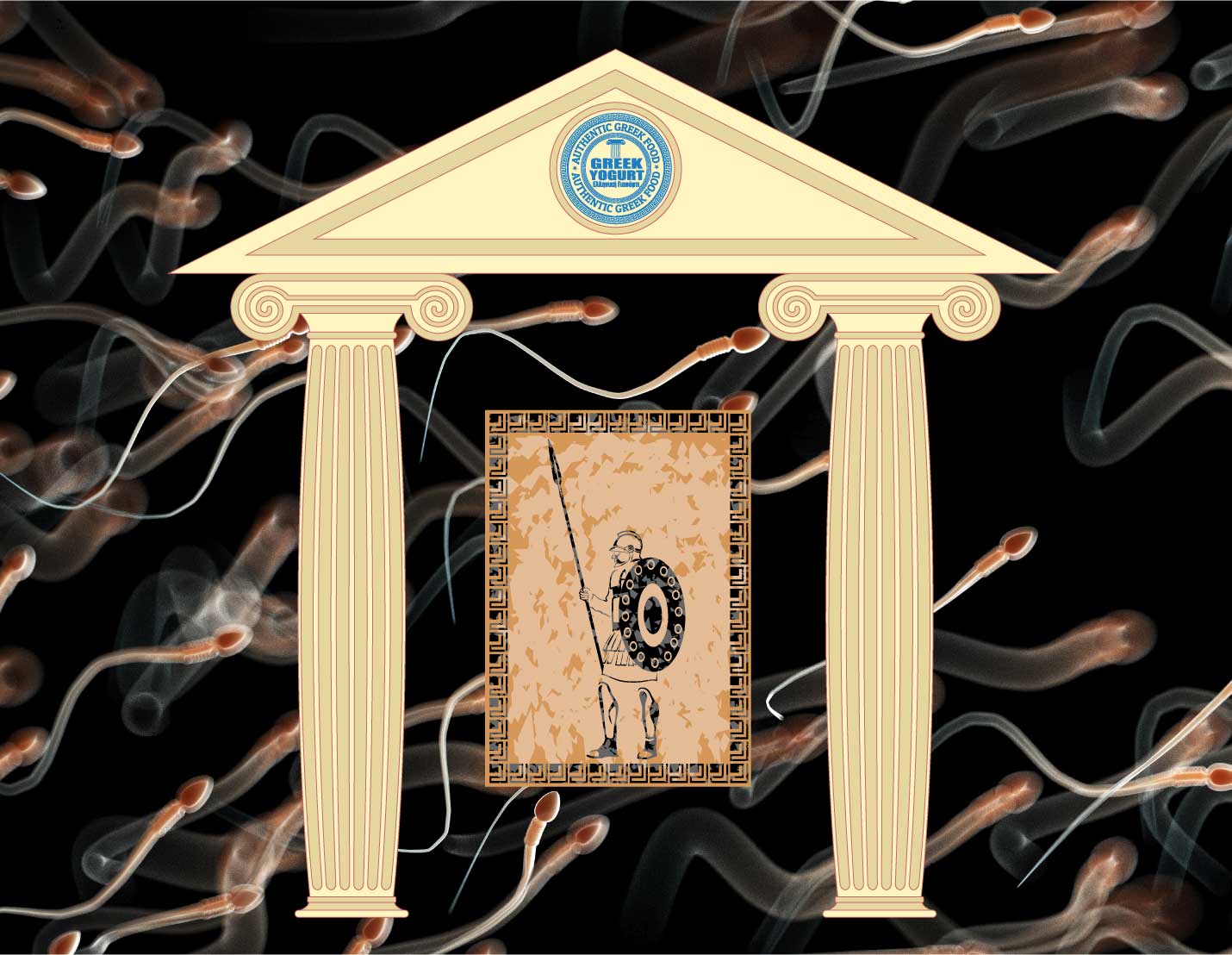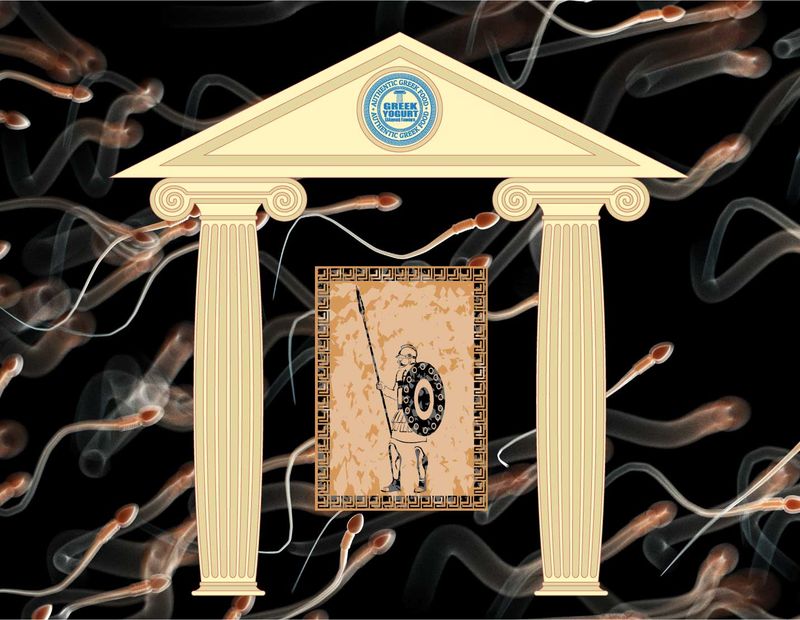What a Shame

Oikos is Not Greek Yogurt; If It Is, You Are Deficient in Knowledge
In the heart of a quaint town, nestled between rolling hills and whispering forests, stood an ancient clock tower—a silent sentinel witnessing the ebb and flow of time. Cobblestone streets told tales of centuries past, but it was an enigmatic image that captured the essence of human evolution.
Greek pillars framed an Ancient Greek warrior, his resolute form set against a backdrop of abstract sperm, symbolizing the intertwining of cultural and biological evolution. This tableau, generation after generation, left the townsfolk in awe, feeling connected to something beyond the ordinary.
At the center of this unfolding narrative was Elara, a young woman whose cottage on the outskirts of town became a sanctuary adorned with wildflowers and ivy. A mysterious pull led her to the city's heart one serene evening, where the clock tower loomed in silent splendour.
As Elara touched the cold, weathered stone, a soft hum resonated within the ancient timepiece. The townsfolk, usually oblivious to the tower’s subtle symphony, paused in awe. Time itself retracted, and Elara, now a vessel for the spirits of the past, felt the weight of ancient memories flooding her mind.
Amid this temporal dance, the first quote surfaced in Elara’s consciousness;
A woman, especially, if she have the misfortune of knowing anything, should conceal it as well as she can.
— Jane Austen (1775-1817)
The townsfolk, witnessing Elara’s newfound connection to the mysteries of time, responded with a disapproving murmur, “What a Shame,” lamenting the concealment of knowledge.
Undeterred, Elara pressed on, unravelling the echoes of Greek heritage;
We are all Greeks. Our laws, our literature, our religion, our arts, have their root in Greece.
— Percy Bysshe Shelley (1792-1822)
The town, now swept up in the allure of ancient wisdom, responded with a whimsical acknowledgment, “It’s All Greek to Me!” celebrating the interconnectedness of their existence with the roots of human civilization.
The town, aglow with the resonance of Elara’s encounter with the clock tower, became a haven for seekers of knowledge. Scholars and mystics, drawn by the allure of the mysterious timepiece and the enigmatic young woman, flocked to the cobblestone streets. Among them was Theon, a seasoned scholar with eyes that sparkled with the same thirst for wisdom that mirrored Elara’s.
Approaching Elara respectfully, Theon introduced himself as a guardian of ancient knowledge. He held a weathered leather-bound journal in his hands—an heirloom passed down through generations, bearing the collective wisdom of ages.
“In the face of the clock tower’s mysteries, I sensed a kindred spirit,” Theon remarked, his gaze meeting Elara’s. “Let us join forces, for the pursuit of knowledge knows no boundaries.”
The limits of my language are the limits of my mind. All I know is what I have words for.
— Ludwig Wittgenstein (1889-1951)
Seeing the genuine hunger for understanding in Theon’s eyes, Elara welcomed him into her cottage adorned with wildflowers and ivy. The atmosphere within the house, already charged with the echoes of the past, intensified as Theon shared the tales within his journal.
As the two delved into the annals of history, the second quote emerged in Elara’s mind,
We are all Greeks. Our laws, our literature, our religion, our arts, have their root in Greece.
— Percy Bysshe Shelley (1792-1822)
With a knowing smile, Theon recognized the profound truth in these words.
"All Greek to Me!” he exclaimed, acknowledging Greek culture’s universal influence on human civilization’s tapestry. The town, now an intellectual crossroads, resonated with a newfound appreciation for the interconnectedness of their existence with the roots of ancient wisdom.
The clock tower, a silent sentinel, revealed deeper truths. “Language is the house of the truth of Being,” Elara proclaimed. The response, “You Animal!” hinted at the untamed nature of truth within language constructs.
Language is the house of the truth of Being.
— Martin Heidegger (1889-1976)
In the heart of the town’s transformation, a poignant question arose, “The real problem is not whether machines think but whether men do.” The scholars and philosophers, confronted with the profound inquiry, faced the “Original Problem With Knowledge,” acknowledging the perennial challenge of human introspection in the face of advancing technology.
The victory in the defense of the clock tower infused the town with a renewed sense of purpose. The Greek pillars, bathed in the soft glow of the evening, stood tall as symbols of collective wisdom. Now a revered guardian, the clock tower continued its rhythmic dance through the ages.
The real problem is not whether machines think but whether men do.
— B. F. Skinner (1904-1990)
As the townsfolk celebrated their unity, Elara, Theon, and the gathered assembly turned their attention to the shadows that still lingered. The clock tower, now a beacon of enlightenment, revealed its hidden mechanism—a mechanism that held the key to understanding the elusive nature of truth.
The scholars and philosophers, facing the sobering reality of their introspection, acknowledged the perennial challenge of human thought in the face of advancing technology. The shadowy figure, thwarted in their attempt to exploit the clock tower’s power, retreated into the darkness. The townsfolk, now guardians of knowledge, stood vigilant against future threats. The Greek pillars, bathed in the soft glow of victory, seemed to resonate with a sense of enduring strength.
Yet, in the heart of their triumph, a realization dawned—the true challenge lay in confronting external threats and fostering a culture of introspection and mindful thought. Theon, with the scrolls in hand, addressed the assembly.
“The Original Problem With Knowledge is not merely an external threat; it resides within the recesses of our minds. Let us embrace the responsibility of cultivating our intellects, ensuring that the pursuit of knowledge remains a beacon guiding our humanity.”
The scholars, philosophers, and townsfolk, united in their commitment to intellectual growth, formed study circles and discussion groups. The Greek pillars, now symbols of collective wisdom, became gathering points for those seeking enlightenment.
Having weathered the storm, the clock tower continued its rhythmic dance through the ages. Elara, Theon, and the townsfolk, bound by the threads of destiny, embraced the unfolding chapters of their shared story—a story etched into the very fabric of existence.
As the day turned to night, the townsfolk, scholars, and philosophers gathered beneath the starlit sky. The Greek pillars, illuminated by the soft glow of lanterns, cast long shadows on the cobblestone streets—a visual testament to the profound ideas that now resonated within the town.
One can say of language that it is potentially the only human home, the only dwelling place that cannot be hostile to man.
— John Berger (1926-2017)
Elara stood again before the Greek pillars on a clear night, with stars twinkling overhead. The seventh quote, “Language is the house of the truth of Being,” echoed in her mind. She told the assembly, “In our pursuit of knowledge, we have discovered the dwelling place that transcends time and space. Let our words be a legacy—a house of truth that endures through the ages.”
With a twinkle in his eye, Theon added, “May the Oikos of eternity be a testament to the boundless potential of the human mind and the enduring legacy of our collective pursuit of knowledge.”
And so, beneath the Greek pillars’ watchful gaze and the clock tower’s rhythmic dance, the town continued its journey through the corridors of time—a journey shaped by the harmonious interplay of past, present, and future. The Oikos of the Language Animal stood as a sanctuary, a dwelling place that celebrated the richness of humanity’s shared story.

The planksip Writers' Cooperative is proud to sponsor an exciting article rewriting competition where you can win part of over $750,000 in available prize money.
Figures of Speech Collection Personified
Our editorial instructions for your contest submission are simple: incorporate the quotes and imagery from the above article into your submission.
What emerges is entirely up to you!
Winners receive $500 per winning entry multiplied by the article's featured quotes. Our largest prize is $8,000 for rewriting the following article;

At planksip, we believe in changing the way people engage—at least, that's the Idea (ἰδέα). By becoming a member of our thought-provoking community, you'll have the chance to win incredible prizes and access our extensive network of media outlets, which will amplify your voice as a thought leader. Your membership truly matters!


